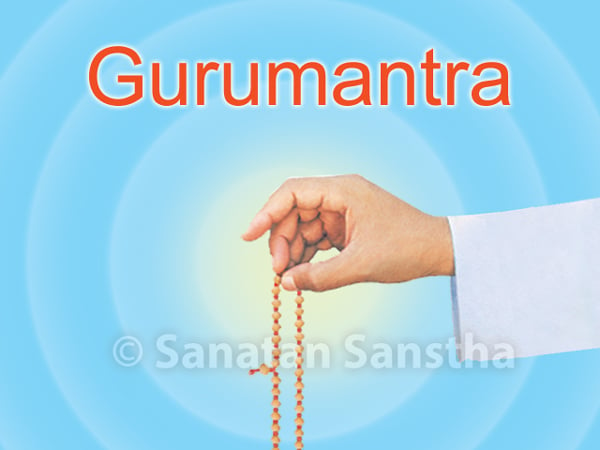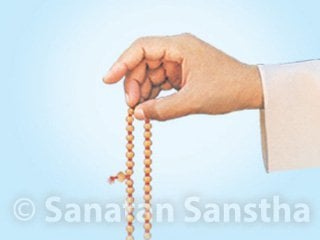The Guru imparts a Gurumantra for the disciples so that they realise that the Guru has bestowed His grace upon them. This article explains importance of chanting the Name given by the Guru, misconceptions about Gurumantra and why it needs to be kept secret.
1. Meaning of Gurumantra
Though the word Gurumantra includes the word ‘mantra’, it mostly implies which Name of God a disciple should chant.
2. Importance of Gurumantra
2 A. Name given by the parents and that given by the Guru
- The name given by parents is to the physical body, that is to the Prakruti (personality); whereas, that (God’s Name) given by the Guru is in accordance with the God Principle.
- Impressions made on the self, make us feel that the name given by our parents is our own. Similarly, we should make oneself feel that God’s Name given by the Guru is our own, through impressions of the Name, that is, by chanting.
- The Name given by the Guru suggests that we belong to someone (to the Guru Principle). We should forget the name given by the parents and consider God’s Name as our own.
The son carries forward the name of his parents, while a disciple carries forward the one given by his Guru.
2 B. Instead of chanting the Name of the
Deity we like, we should chant the Name given by the Guru
- We should chant the Name given by the Guru instead of the Name of the Deity we like for the reasons ahead.
- We do not know chanting of which Name is good for our spiritual progress; only the Guru can tell us.
- By chanting mantra of the Deity we like, only sattvikta (Purity) increases; whereas, with the Gurumantra we can reach the nirgun (Non-materialised) level.
- Since the Gurumantra consists of not only the alphabets, but knowledge, Chaitanya (Divine consciousness) and Guru’s blessings too, spiritual progress is swift. The Chaitanya enriched Name is known as ‘bijmantra’ or ‘Divyamantra’. Obviously, to get the fruit from the ‘bij’, that is, the seed, we have to perform spiritual practice.
- Due to faith in the Guru, we chant the Gurumantra with greater faith than the mantra decided upon by oneself. Also, when remembering the Guru, we tend to chant the Name given by Him and thus, our chanting increases.
- While chanting the Name of the Deity we like, there is a certain amount of ego. In contrast, while chanting the Name given by the Guru, there is no ego.
3. Qualities required in the Guru for
initiating chanting of God’s Name (meaning, spiritual practice) in others
Qualities such as Namjapa (Chanting), satseva, tyag, priti (Unconditional love), and faith should be present at least to the extent of 70%. (In an ordinary individual, these qualities are present in the range of 0 – 2%). Ego should be very less, that is, 5%. (In an ordinary individual, it is 30%)
4. Misconceptions about the Gurumantra
Many people have the following misconceptions about the Gurumantra. The reason for developing these misconceptions is that they are not familiar with the spiritual terminology.
- Baba would often tell people to chant ‘Hari Om Tatsat’. These people would think that they have been initiated with a Gurumantra by Baba. However, when Baba tells someone to chant ’Hari Om Tatsat’ the implied meaning is that they should chant God’s Name.
Gondavlekar Maharaj used to recommend chanting of Shriram’s Name to everyone. His books too recommend the same, but here the meaning is ’Chant God’s Name’. Not understanding this, many people feel that they have been blessed by a Guru. Then, they wonder why they are not getting any spiritual experiences despite their having a Guru (when actually they have not been blessed by one). - At times, on Gurupournima day Baba would impart the Gurumantra at the insistence of His disciples. However, even such mantras are not real Gurumantras.
- When a seeker is initiated with a Gurumantra, he becomes a disciple. However, when the discipleship is namesake, how can the Gurumantra be real ? Baba would say, “Namesake disciple and a namesake Guru”. Since most of the people are unable to understand this, they consider themselves to be disciples of Baba.
- Since Baba would refer to both – those who merely pay their respects to Him as well as seekers as devotees or disciples, many were convinced that they were Baba’s disciples. Since Baba would look at everyone with equanimity, He did not get thoughts like ’He is My disciple’ and ’He is not My disciple’. As a result, He called everyone His disciple.
5. Receiving a Gurumantra
5 A. Who receives a Gurumantra ?
Only an intense mumukshu or one who has intense desire for Guruprapti or a Gurumantra. If one considers the spiritual level of an ordinary individual to be 20% and that of the one who has attained Moksha (Final Liberation) to be 100%, we can say that an ordinary individual is not at all interested in Spirituality. An individual with 30% spiritual level performs ritualistic worship of Deities, reads Holy texts and goes to temples. At a spiritual level of 40%, he is able to chant God’s Name. At a spiritual level of 50%, he does satseva and at 60%, tyag in the real sense of the word commences. At 55% level, he is blessed by a Guru and is initiated with a Gurumantra. In short, only when the interest in Spirituality exceeds 50% does a Saint behave as a Guru towards that seeker. Only when an individual sacrifices more than 55% of his body, mind and wealth for Spirituality does he receive a Gurumantra. Hence, despite remaining in the Guru’s company for many years people are not initiated with a Gurumantra because they have not attained the required spiritual level.
5 B. Receiving a Gurumantra through a vision in a dream
Saint Tukaram’s example is well-known for this. He was initiated with the Gurumantra ‘Ram Krushna Hari’ by His Guru, Babaji Chaitanya, through a vision in a dream. When the Guru imparted this mantra to Him, He (the Guru) had renounced His body. The following points will help us recognise whether the mantra in a dream is psychological, based on the rule that ‘one dreams in accordance with the impressions in the subconscious mind’ or they are spiritual in nature, that is, whether a vision in a dream is true.
- If a mantra is repeated in a dream on three consecutive nights, it indicates a spiritual dream.
- If a spiritually evolved individual is asked, then He deciphers if the mantra in the dream is psychological or spiritual in nature.
5 C. Do not ask for a Gurumantra
We should not ask any Guru for a Gurumantra. Not just a Gurumantra, but a Guru does not give anything the individual does not deserve and if deserving then He gives it Himself. Once when Bhau Bidwai (known as Achyutanand), one of Baba’s disciples, was leaving for his office Baba summoned him and initiated him with a Gurumantra.
6. The real Gurumantra
When the Guru spontaneously tells someone to chant a Name, it is a Gurumantra. However, it is not enough to just receive a Gurumantra. It is necessary to continue chanting the Gurumantra and complement it with satseva, tyag and love for others.
7. Where should one chant a Gurumantra ?
Baba’s Gurumantra is of the Bhaktimarg (Path of Devotion) and is not related to Karmakanda; therefore, it can be chanted anywhere all the twenty-four hours of the day. Baba Himself has told some people to chant in the toilet, during menses, during soyar and sutak, under all circumstances for that matter. All places and time have been created by God Himself, hence there is no question of chanting the Gurumantra at a particular place or time. However, if the Guru Himself has imposed some restrictions, then they should certainly be followed.
8. Why is it said that – A Gurumantra should be kept secret
- When initiating a seeker with a mantra, the Guru considers the seekers’s requirements and incorporates His energy into it. When the same mantra is told by that seeker to someone else, the latter does not benefit from it as the seeker does not have the required spiritual energy. If this happens, then there is a possibility that on hearing the latter’s experience the seeker may also get misled and he too may give up spiritual practice.
- When someone has to keep something secret, he remembers it constantly. Similarly, when a mantra is to be kept a secret, the chanting of the mantra increases.
- Since everyone’s mantra is different, knowing the other’s mantra will not be of any use to the other.
- A Gurumantra is not simple chanting of God’s Name, but a mantra; hence, if one chants another’s mantra wrongly, it may prove harmful. However, when conversing with other seekers, there is no need to keep a mantra or any other spiritual practice a secret, since through it everyone is able to learn something. Besides, discussion does not cause any harm.
Ramanuj was given the Gurumantra ‘Om Namo Narayanaya’ by Goshthipurna and was ordered to keep this a secret. Since He was told that, one can attain Mukti (Liberation) with this mantra, Ramanuj climbed the roof of a nearby temple and started chanting the mantra aloud. Many passers-by heard this mantra. When Goshthipurna heard this, He was enraged and said to Ramanuj, “You have disobeyed my order. You will languish in Hell”. Ramanuj responded, “If by your grace all these people attain Mukti then I will happily go to Hell”. Hearing this, Goshthipurna was pleased and said, “From today onwards, the doctrine of Vishishthadvaitwad will be known as ‘Ramanujdarshan’ after you”.
9. The superfluousness of a Gurumantra
9 A. Those who perform spiritual practice
as per the science of Spirituality do not need a Gurumantra
Guru is not merely a gross body; He is the God Principle on the earth. Guru Himself has taught the science of Spirituality. Hence, the one who performs spiritual practice as per the science of Spirituality does not need a Guru or a Gurumantra. For such seekers, the Name of the Deity they chant itself functions as a Guru.
9 B. Just as parents of a child and the child,
do not need to say that they love each other, so also in a
true Guru-disciple relationship, a disciple realises that the Guru has bestowed His grace upon him
The Guru does not need to tell the disciple that. Yet, in the beginning, most disciples do not perceive that the Guru has showered His grace upon them. The Guru imparts a Gurumantra for them to realise this. Consequently, the disciple begins to feel that he has a Guru who takes care of him and bestows him with His grace.
Reference: Sanatan Sanstha’s Holy Text “Importance of the Guru, types and Gurumantra”


 Why do we chant Name of Kuladevi instead of Kuladev?
Why do we chant Name of Kuladevi instead of Kuladev? Remember this while performing the rites of cremation during calamitous times!
Remember this while performing the rites of cremation during calamitous times! Remedies for mental illness arising in an emergency
Remedies for mental illness arising in an emergency how to improve mental strength to face a terrible situation such as a riot
how to improve mental strength to face a terrible situation such as a riot Unique Spiritual experiences of Miss Smital Bhujle after chanting Om Namah Shivay
Unique Spiritual experiences of Miss Smital Bhujle after chanting Om Namah Shivay Do you know, Yogic postures and pranayam accompanied with chanting enhances its benefits!
Do you know, Yogic postures and pranayam accompanied with chanting enhances its benefits!